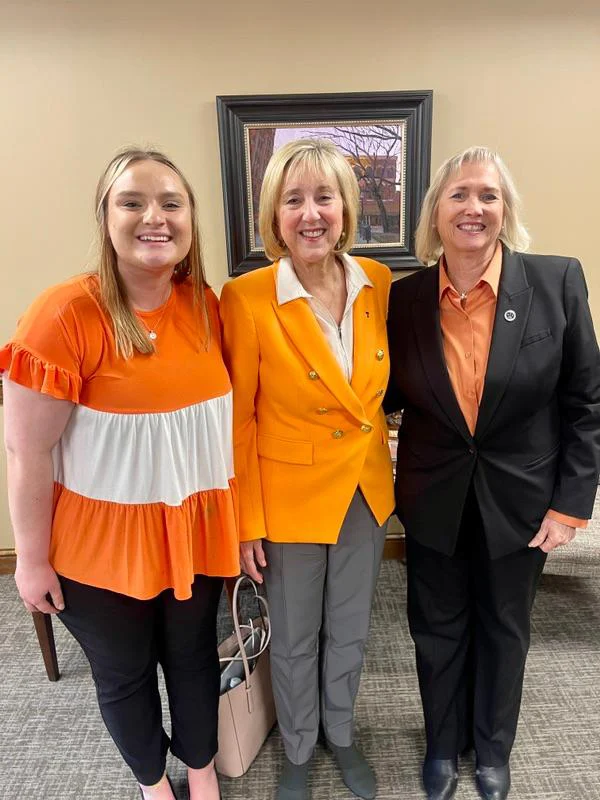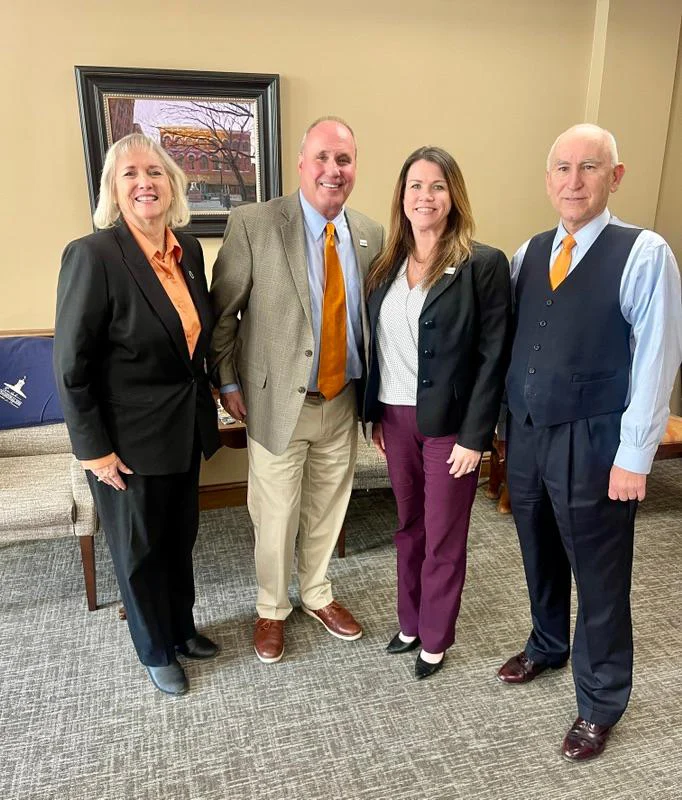
News From Nashville
On Capitol Hill last week, Senate committees were in full swing. In the first week of budget hearings from state departments and agencies, Senate committees approved eleven of sixty-three total budgets. Lawmakers also advanced many important bills to protect children, improve school safety and increase educational opportunities.
School safety, education and helping children highlight the week
Legislation advances to change fire alarm protocols for improved school safety
The Senate Education Committee last week voted unanimously to pass legislation requiring schools to determine the cause of a fire alarm before allowing children to leave their classrooms.
Senate Bill 1679 is among several safety proposals filed in response to the Covenant School shooting in Nashville on March 27, 2023. On that tragic day, smoke from the shooter’s weapon triggered the school’s fire alarm. Unaware of the active shooter and in response to the alarm, one of the six victims, William Kinney, 9, was leading his third-grade classmates to safety as line leader when he was fatally shot by a former student of the school. Kinney was the first to encounter the shooter in the hallway of the school.
The legislation has passed the House of Representatives and now moves to the Senate floor for final approval before heading to the governor’s desk for his signature.
Committee approves legislation to permanently fund Tennessee Promise Completion Grant
Last week, the Senate advanced legislation to make the tnAchieves COMPLETE Program a permanent part of the TN Promise scholarship to help low-income students complete college. The COMPLETE program started as a pilot project in Knox County in 2019 and has been a statewide pilot program since 2022. The program matches students with COMPLETE coaches and helps them in various areas like developing soft skills, goal setting and accessing grant funds. Students who are connected with a coach have access to $1,000 grants to aid students with costs outside of the TN Promise.
Senate Bill 1783 also identifies sustainable funding from Tennessee Sports Wagering revenue to make the program permanent.
The grant funds can help cover expenses like transportation, groceries, computers, supplies, and textbooks. The excess costs necessary to attend school can inhibit students from returning to complete their education. Statistics show that when students were introduced to a coach, the retention rate rose to 74 percent. When students received a coach and a grant, retention rose to 82 percent.
The legislation passed the Senate Education Committee and awaits approval from the Senate Finance Committee.

Janet Bravo and her staff with the new
Knoxville Preparatory School.
In Brief…
Helping relative caregivers with children in their custody – The Senate Judiciary Committee approved legislation last week to make it easier for family members to care for children who have suffered parental neglect or abuse. Senate Bill 2071 makes changes to the Relative Caregiver Program which provides stipends to those who meet a certain income threshold to care for children in their family. Since the program’s inception in 2022, many interested families have not qualified for the stipend because they are over the income limit. This legislation removes that limit, opening eligibility to all families. It also streamlines the court process for a family member to become eligible for the stipend by allowing eligibility for relative caregivers awarded custody by a court. Previously, a final custody order from Juvenile Court was required to receive the stipend, which was a burdensome and lengthy process.
Removing barriers for state employees to become foster parents – The Senate State and Local Government Committee advanced legislation to improve and increase the number of foster homes in Tennessee. Under Senate Bill 1941, state employees will not have to use their paid time off to complete the required training to become a foster parent. It is estimated that around 200 state employees will become foster parents at some point. The bill awaits final passage from the full Senate.
Protecting children from sexual abuse – The Senate Finance Committee passed Senate Bill 287 to add continuous sexual abuse of a child to the list of offenses that require a defendant to have community supervision for life. In Tennessee, people convicted of continuous sexual abuse of a child are required to serve their entire term, which averages nearly 24 years.
Data sharing among Child Protective Investigative Teams (CPIT) – Another bill, if passed, will allow more timely and accurate information to be shared regarding children who have been abused, the services provided to them, and the outcome of their perpetrators. This bill codifies existing practice regarding information sharing within all statewide CPIT partners. Senate Bill 1586 passed the Senate Judiciary Committee and awaits final consideration from the Senate.
Increasing access to life-changing testing for children with rare disorders – Last Tuesday, the Senate Commerce and Labor Committee passed a bill sponsored by Senator Richard Briggs allowing TennCare to cover medical expenses for genetic testing to identify treatments for children with rare diseases. According to the National Organization for Rare Disorders, over 7,000 such conditions exist, predominantly affecting children, with 80% stemming from genetic origins. Senate Bill 1762 offers hope to families by easing the financial burdens of identifying and treating a rare disease. It would allow parents to access testing that could streamline the diagnosis process and potentially save a child’s life. The bill now advances in the Senate Finance, Ways and Means Committee.


Increasing credit for work-based learning – The Senate Education Committee advanced legislation to increase the number of available credit hours for high school work-based learning programs from a yearly maximum of three to six. Senate Bill 1853 also clarifies that a student needs a minimum of five hours a week of supervised work experience to receive each credit. In other words, if a student takes three credits in the fall semester and three credits in the spring, that student would need a minimum of 15 hours on a worksite each week. Currently, seniors can receive credit for their work experience in the first semester, but not in the second. This bill would fix that so seniors enrolled in work-based learning programs are receiving full credit for their work.
Policies for AI in higher education – The Senate Education Committee this week advanced legislation seeking to address the current and future disruptions of artificial intelligence in the classroom. Senate Bill 1711, sponsored by Sen. Joey Hensley (R-Hohenwald), directs public K-12 schools and higher education institutions to adopt policies regarding the use of AI for students and staff for the 2024-2025 school year. The bill also encourages higher education institutions to collaborate on the policies.
The Mathematics Support Act – To improve proficiency in math for Tennessee students, the Senate Education Committee approved legislation to strengthen educator preparation for mathematics instruction. Senate Bill 1712 creates a mathematics expert review committee to evaluate and report on the landscape of mathematics instruction in Tennessee as well as identify professional development options available to improve instruction and student proficiency. The Department of Education must also approve at least one standards-aligned mathematics professional development course for K-8 teachers by July 1, 2025.
Improving communication with mental health institutions – In order to help local law enforcement agencies protect public safety by improving communication with mental health institutions, Senate Bill 1681 clarifies that local law enforcement agencies and local courts must be informed when a patient who lives in their jurisdiction is released from a psychiatric institution. The notifications sent to law enforcement will let officers know that individuals who may be a danger to themselves or others are returning to their homes. Currently, the way the law is written, mental health institutions only alert law enforcement about involuntary commitments in the jurisdiction of the institution. However, if the patient lives in a different county than the location of the mental health facility, then law enforcement in the patient’s county is not informed. The legislation passed the Senate Health and Welfare Committee and advances to the Senate floor.
Providing bonuses for military personnel with specialized skills – Last week, the Senate State and Local Government Committee advanced legislation to help recruit and retain Tennessee National Guard service members with specialized skills. Senate Bill 2081 allows the Department of Military to administer a critical skills retention bonus program to fill critical military operations specialties within the Tennessee National Guard. The bill also ensures that service members do not suffer financially when called to active duty by codifying partial paid coverage. Under this bill, if a service member is called to active duty at a salary less than their usual, the service member will still receive their regular state salary.
Helping local governments mitigate risks from natural disasters – In an effort to give more resources to help local governments and rural counties prepare for national disasters, the Senate State and Local Government Committee advanced the Resilient Tennessee Revolving Loan Fund Act. The legislation would authorize the State of Tennessee to receive federal funds via the STORM Act. The STORM Act was passed by Congress in 2021 and allows eligible states to receive a loan fund for hazard mitigation assistance to reduce risks from natural hazards and disasters. Senate Bill 2082 now advances to the Senate Finance Committee.
Preventing DUI homicide recidivism – In 2011, Dustin Ledford was killed by an intoxicated driver. The offender was paroled and subsequently reoffended, almost taking another life. Ledford’s Law aims to reduce the chances that offenders in DUI homicide cases will reoffend and, once again, jeopardize the lives of others on the road. The bill, which passed the Senate floor last week, requires substance abuse treatment or behavioral counseling for offenders on parole. Many offenders do not continue substance abuse treatment once paroled, and this bill will address the problem and help reduce recidivism rates.
Protecting rights for power of attorneys in healthcare decisions – The Senate passed legislation to ensure those with power of attorney for healthcare decisions cannot be prevented from visiting the patient in the hospital. During the height of the COVID-19 pandemic, some hospitals suspended or revoked a patient’s power of attorney’s right to visit and make healthcare decisions. Unfortunately, this caused many patients to pass away without being able to say goodbye to their loved ones. Senate Bill 1641 would prohibit hospitals from restricting or terminating a power of attorney’s visiting rights during a state of emergency. Visitors would still be required to follow safety protocols.
Healthcare Sharing Ministries Freedom to Share Act – In an effort to increase healthcare access to Tennesseans is sponsoring legislation to ensure healthcare sharing ministries are only regulated as a tax-exempt, nonprofit and not as an insurance company. These ministries pool financial resources of members who share a common set of ethical or religious beliefs to cover costs of participants’ medical needs. All participants are encouraged to donate to the organization, but are not required to. These ministries help individuals without the ability to pay out-of-pocket costs for medical care. Senate Bill 862 passed the Senate and will be sent to the Governor for his signature.

I’m joined by my daughter Courtney Kohlhepp
and Brandon Orr.



My legislation
SB 2075- Tooth Act: Authorizes a dentist who works for the Department of Health or in the state safety net program for the uninsured to supervise up to five dental hygienists (previously it was 3).




If our office can ever be of service to you or your family, please don’t hesitate to contact us. On the left is Carly Nelson, my Legislative Assistant. On the right is Debbie Gazzaway, our Research Analyst for the Transportation and Safety Committee. We can help with issues with a state department, information on legislation, setting up a tour of the Capitol or scheduling an appointment or speaking engagements.
For information on State Senators including phone numbers and email addresses, click Tennessee State Senators.
For House members, click Tennessee House Members
For all other information on the General Assembly including legislation, schedules and videos, click Tennessee General Assembly
As always thank you for continued support!
Sincerely,
Becky Massey
District 6 Senator
615-741-1648
sen.becky.massey@capitol.tn.gov
